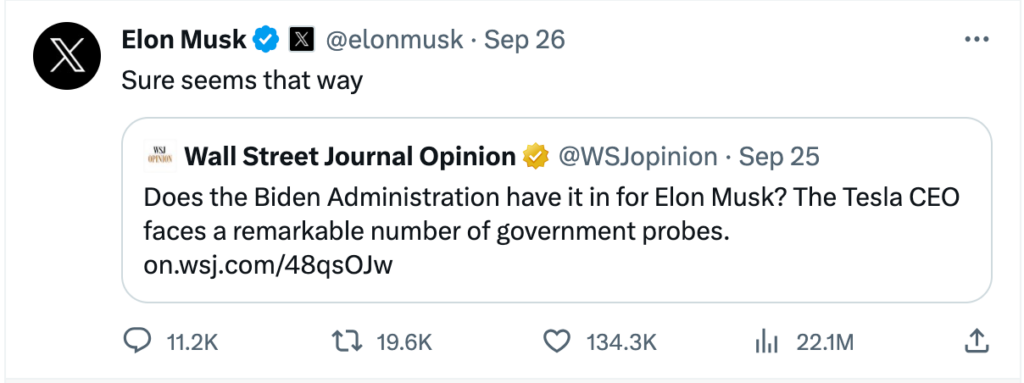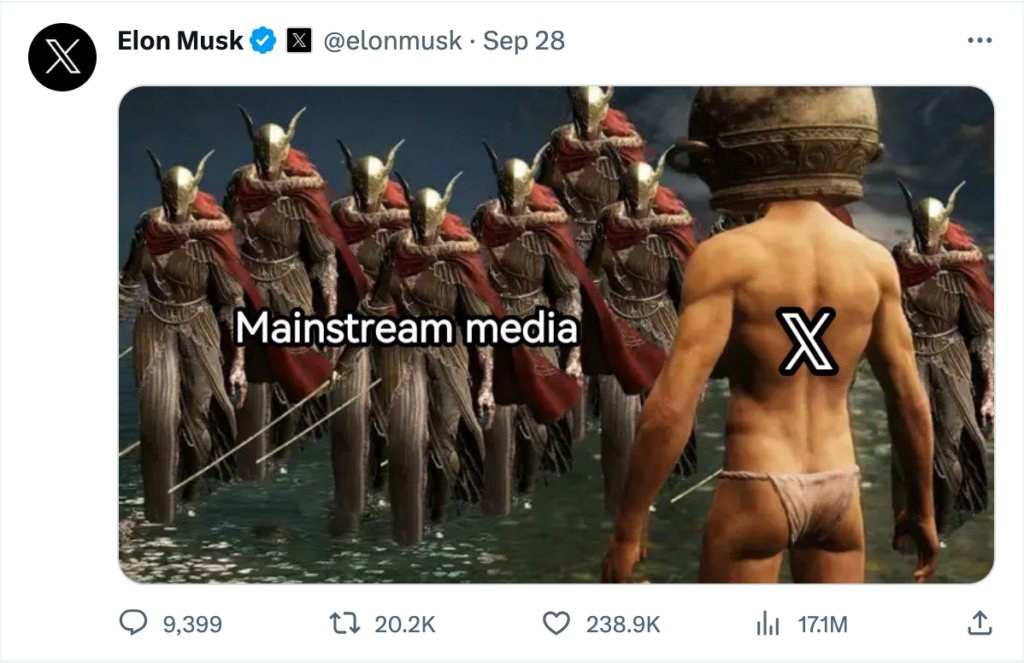Elon Musk scraps misinformation flags just before elections

• Elon Musk’s X has scrapped a misinformation reporting function.
• X under Elon Musk offers viewers the most misinformation of the big six social media platforms.
• Rumors claim that crucial anti-misinformation staff have left the company.
Elon Musk’s X has disabled a feature that allowed users to report misinformation about elections.
Researchers at Reset.Tech Australia pointed out the feature had been removed in recent weeks – apart from in the European Union – a move that’s fuelling concerns for the 2024 US presidential elections. In Australia, a key referendum is also being held to give Indigenous people more rights.

Photograph: Jacquelyn Martin/AP.
Australian authorities say that the current spread of misinformation is the worst it’s seen yet. The upcoming referendum in Australia is the first in almost 25 years and will take place on October 14.
In a letter, Reset.Tech said the removal of the misinformation reporting tool is “extremely concerning.”
“There now appears to be no channel to report electoral misinformation when discovered on your platform,” the group said.
The tool, which allowed users to specify that misinformation was political, has been scrapped in the US, too, just in time for the lead up to the 2024 presidential elections. (It’s no secret which way Musk will be voting).

Musk is convinced that the Biden administration is out to get him.
Posts that users consider hateful, abusive or spam can still be reported.
The misinformation reporing feature, now scrapped, had been available in the US, Australia and South Korea since 2021, and was expanded to three more countries last year – Spain, Brazil and the Philippines.
Reset.Tech says the ability to flag electoral misinformation is now available across Europe in a slightly different format. EU users can now report a post for “negative effects on civic disorders or elections.” This isn’t available in the UK and never has been.
X has more misinformation than other social media
in addition to the removal of the misinformation reporting tool, the results of a study carried out by the European Commission have been revealed, showing that X carries the greatest amount of disinformation of the big six social networks.
The study examined over 6,000 unique social media posts across Facebook, Instagram, LinkedIn, TikTok, X and YouTube.
It analyzed content in three countries deemed particularly at risk of disinformation spreading: Spain, Poland and Slovakia. They are considered at risk due to upcoming elections or proximity to the war in Ukraine.
The study was enacted by TrustLab, a disinformation monitoring start-up, as part of work to support the EU’s code of practice on disinformation. X (although it was still Twitter at the time) signed up to the voluntary code, along with many other social networks, in 2018.
Under Musk’s leadership, the company has withdrawn from the code. X will, however, still be subject to the EU’s Digital Services Act (DSA) which regulates the conduct of large tech platforms.
Under the DSA, the EU intends to make the code of practice on disinformation a code of conduct – at which point, opting out will no longer be an option.
“Mr Musk knows that he is not off the hook by leaving the code of practice, because now we have the Digital Services Act fully enforced,” Ms Jourova said.
Companies that fail to comply with the Act could face fines of up to six percent of their global turnover.
Trustlab’s study found that X had the largest “ratio of discoverability” of disinformation. That means it’s the platform on which there’s the greatest chance a user will come across disinformation. YouTube was found to have the lowest.
Apparently, X had the largest “ratio of discoverability” of disinformation – the greatest chance a user would come across disinformation. YouTube was found to have the lowest.
“My message for [X] is: you have to comply with the hard law. We’ll be watching what you’re doing,” warned EU Values and Transparency Commissioner Vera Jourova in the wake of the study.
The EU’s Digital Services Act is designed to stop election interference and protect users – and tech giants must comply if they want to operate within the EU.
Elon Musk’s X: standing for hate?
Since Musk took over the social media platform, the company has been accused of allowing a rise in hate speech and misinformation. Elon Musk denied this in a BBC interview.

The mainstream media are after his company, too.
He argues that the “Community Notes” feature of the platform, allowing users to comment on posts to flag false or misleading content, is a better way of fact-checking.
Giant difference, no matter how you count it https://t.co/eczcGJsRMa
— Elon Musk (@elonmusk) September 18, 2023
The above Tweet, from Musk himself, has had context added. In this case, the false impression of wider reach is pointed out – just one problem with his apparent conviction that X should be an independent news organization. He’s also advocating for “citizen journalism,” the idea that being ‘on the ground’ as events happen and livestreaming or taking video to be posted on X is an effective way of sharing news.
Musk has gutted the team dedicated to preserving election integrity. “Oh you mean the ‘Election Integrity’ Team that was undermining election integrity? Yeah, they’re gone,” Musk wrote in a post on Wednesday, in response to a report in The Information.
More than 50 major elections are expected around the world next year, including the US presidential election but also in India, Africa and the European Union.
The job cuts stand in stark contradiction with recent statements by X’s CEO Linda Yaccarino, who told the Financial Times last week that the platform was expanding its teams ahead of the busy election season.
Asked about the report in a separate interview at the Vox Code Conference on Wednesday, Yaccarino said election integrity was “an issue we take very seriously.”
“Contrary to the comments that were made, there is a robust and growing team at X that is wrapping its arms around election integrity,” she added.
This might be taken as evidence of infighting at X. Further, reports say that several staff working out of the Dublin office – including the co-lead of the election disinformation team, Aaron Rodericks – have left the company.
Rodericks had recently secured an injunction against the company, restraining it from taking disciplinary action after he posted information about its recruitment of staff for his team on his personal account.
He claimed the company did nothing after he was subjected to a barrage of abuse from people accusing him of trying to stop freedom of speech on X.
Last month he posted an advert on LinkedIn for eight new roles, revealing he was seeking people with a “passion for protecting the integrity of elections and civic events,” and adding “X is certainly at the center of the conversation.”
That might be the case, but how honest and true the conversation is remains to be seen over the course of the coming year.











